When travelling or living in a Chinese speaking country, it is essential that you know how to say the Chinese word for food in Mandarin Chinese. You might not find anyone who speaks English, especially if you are not travelling or living in the city. In the country side, they might not even have menus in the eateries or restaurants you can point to when you order.
In this post, you get to learn the 22 Chinese words for food in Mandarin Chinese you can bring with you when you travel to Chinese speaking countries.
Breakfast
Breakfast is the most important meal of the day. The Chinese word for breakfast is 早餐 or 早饭. In China, or other Chinese speaking countries, breakfast usually consist of noodles or rice, unlike in the Western countries. If you prefer bread, cereal, pancakes or toast, you won’t be able to find them in local eateries. Instead you will find breakfast mainly associated with flour or rice such as youtiao, steamed buns, congee and many more.
Dialogue
Peter woke up late and had no time to eat breakfast. On the way to work, he met his colleague Lee. Let us learn how to ask a person whether he/she has eaten breakfast in Mandarin Chinese.
李:你吃早饭了吗?
Lǐ: Nǐ chī zǎo fàn le ma?
Lee: Have you taken your breakfast?
彼得:还没,现在我很饿。
Bǐdé: Hái méi, xiàn zài wǒ hěn è.
Peter: Not yet. I am very hungry now.
李:你想吃点儿什么?
Lǐ: Nǐ xiǎng chī diǎn er shén me?
Lee: What you want to eat?
彼得:豆浆油条。
Bǐdé: Dòu jiāng yóu tiáo.
Peter: soy milk with youtiao
Dialogue in Traditional Chinese format
李:你吃早飯了嗎?
彼得:還沒,現在我很餓。
李:你想吃點兒什麼?
彼得:豆漿油條
Chinese breakfast
These are some of the traditional Chinese breakfast we eat every morning.
Western Breakfast
Lunch
Lunch time is usually between 12 to 2pm. The Chinese word for lunch is 午餐 [wǔ cān ]. As lunch time is short, only an hour, most people will either bring their own food to the work place or eat something simple at an eatery nearby. In China, the workers will finish their food fast and go back to the workplace for a short nap before they resume work.
李:美国人午餐都吃些什么?
Lǐ: Měi guó rén wǔcān dōu chī xiē shén me?
Lee: What do Americans eat for lunch?
彼得:沙拉和三文治。
Bǐdé: Shā lā hé sān wèn zhì.
Peter: Salad and sandwiches.
李:我讨厌吃沙拉。感觉在吃草。
Lǐ: Wǒ tǎo yàn chī shā lā. Gǎn jué zài chī cǎo.
Lee: I hate salad. Feels like eating grass.
彼得:我们到哪儿吃中饭呢?
Bǐdé: Wǒmen dào nǎ’er chī zhōng fàn ne?
Peter: Where should we go for lunch?
李:这附近有家好吃的面馆,我们到那吃吧。
Lǐ: Zhè fù jìn yǒu jiā hào chī de miàn guǎn, wǒmen dào nà chī ba.
Lee: There is a delicious noodle restaurant nearby. Lets eat there.
Dialogue in Traditional Chinese format
李:美國人午餐都吃些什麼?
彼得:沙拉和三文治。
李:我討厭吃沙拉。感覺在吃草。
彼得:我們到哪兒吃中飯呢?
李:這附近有家好吃的麵館,我們到那吃吧。
Lunch menu
Asian
Western
Dinner
Working adults usually finish work around 6-7pm. After work, they will either go home to have dinner with their families or go to a restaurant to have dinner with friends or colleagues. Chinese word for dinner is 晚饭 or 晚餐.
李:去吃晚饭吧!
Lǐ: Qù chī wǎn fàn ba!
Lee: Let‘s go for dinner.
彼得:去哪儿?有没有又便宜又好吃的地方?
Bǐdé: Qù nǎ’er? Yǒu méi yǒu yòu pián yí yòu hào chī dì dì fāng?
Peter: Where? Any cheap and delicious places?
李:当然有。你想吃什么?
Lǐ: Dāng rán yǒu. Nǐ xiǎng chī shén me?
Lee: Of course. What you want to eat?
彼得:宫保鸡丁和麻婆豆腐。
Bǐdé: Gōng bǎo jī dīng hé má pó dòu fu.
Peter: Kung Po Chicken and Ma Po Tofu.
Dialogue in Traditional Chinese format
李:去吃晚飯吧!
彼得:去哪兒吃?有沒有又便宜又好吃的地方?
李:當然有。你想吃什麼?
彼得:宮保雞丁和麻婆豆腐。
Restaurant talk in Mandarin Chinese
Reservation
李:请在星期三晚上给我订一个单间。
Lǐ: Qǐng zài xīng qí sān wǎn shàng gěi wǒ dìng yī gè dān jiān.
Lee: Please reserve a room for me on Wednesday night.
饭店:请问一共几位?
Fàndiàn: Qǐng wèn yī gòng jǐ wèi?
Restaurant: How many of you?
李:十位。
Lee: 10.
Lǐ: Shí wèi.
饭店:大约几点来?
Fàndiàn: Dà yuē jǐ diǎn lái?
Restaurant: What time will you arrive?
李:七点左右。
Lǐ: Qī diǎn zuǒyòu.
Lee: around 7pm.
饭店:请问您贵姓?
Fàndiàn: Qǐng wèn nín guì xìng?
Restaurant: What’s your last name?
李:我姓李。
Lǐ: Wǒ xìng lǐ.
Lee: It’s Lee.
饭店:谢谢。
Fàndiàn: Xièxiè.
Restaurant: Thank you.
Dialogue in Traditional Chinese format
李:請在星期三晚上給我訂一個單間。
飯店:請問一共幾位?
李:十位。
飯店:大約幾點來?
李:七點左右。
飯店:請問您貴姓?
李:我姓李。
飯店:謝謝。
Request
1. 请拿份菜单。
Qǐng ná fèn cài dān.
Could you bring the menu?
2. 有套餐吗?
Yǒu tào cān ma?
Do you have set menus?
3. 请推荐一个特色菜吧?
Qǐng tuī jiàn yī gè tè sè cài ba?
Could you recommend your specialty?
4. 请快点儿上,我们赶时间。
Qǐng kuài diǎn er shàng, wǒmen gǎn shí jiān.
Please be quick, we are in a hurry.
5. 先要这些,不够再点。
Xiān yào zhè xiē, bù gòu zài diǎn.
That’s all. We will order again if needed.
6. 你们有带图片的菜单吗?
Nǐmen yǒu dài tú piàn de cài dān ma?
Do you have a menu with pictures?
7. 你们有英文菜单吗?
Nǐmen yǒu yīng wén cài dān ma?
Do you have an English menu?
8. 请给我热的免费茶。
Qǐng gěi wǒ rè de miǎn fèi chá.
Please give a cup of hot free tea.
9. 我们的菜还要等多久?
Wǒmen de cài hái yào děng duō jiǔ?
How long do we need to wait for our dishes?
10. 这不是我点的。
Zhè bù shì wǒ diǎn de.
This is not my order?
Talking about food preference
1. 我不能吃辣。
Wǒ bù néng chī là.
I can’t eat spicy food.
2. 太油了,我受不了。
Tài yóu le, wǒ shòu bù liǎo.
It’s too oily, I can’t stand it.
3. 口味太重了, 有没有清谈的?
Kǒu wèi tài zhòng le, yǒu méi yǒu qīng tán de?
It’s too rich, do you have something lighter?
4. 我对花生过敏。
Wǒ duì huā shēng guò mǐn.
I am allergic to peanuts.
5. 我不吃煮得太老的肉。
Wǒ bù chī zhǔ dé tài lǎo de ròu
I don’t eat overcooked meat.
Payment
1. 买单。
Mǎi dān
Bill, please
2. 我请客。
Wǒ qǐng kè
It’s my treat.
3. 我们AA制吧!
Wǒmen AA zhì ba!
Let’s go dutch.
The next time you visit a restaurant in China or other Chinese speaking countries, do try to make use what you have learned in this post. Bon Appetite!
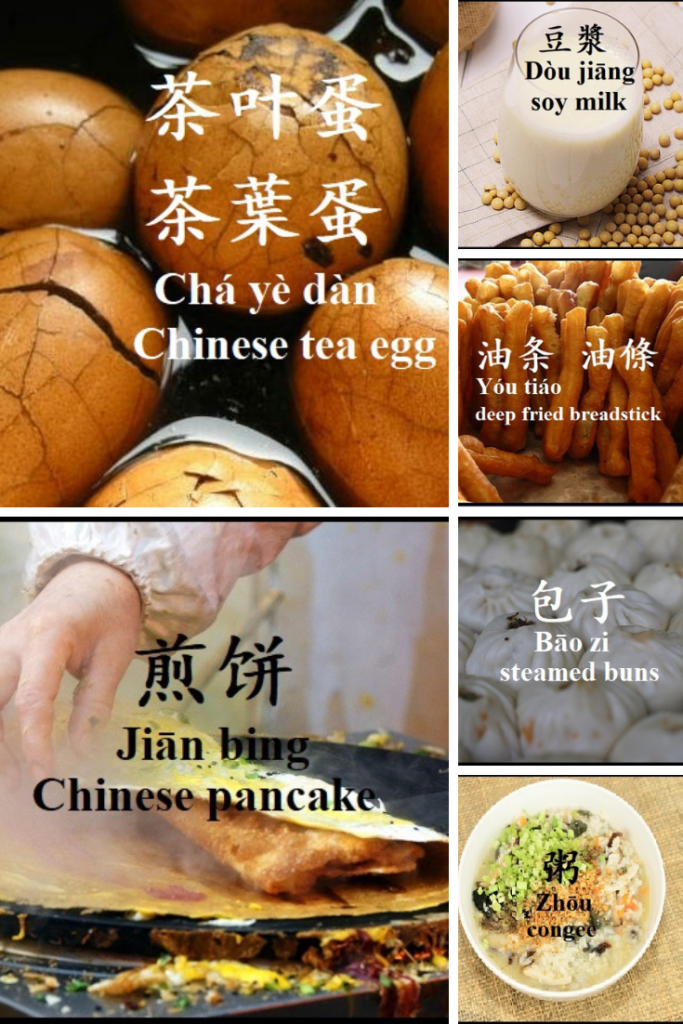
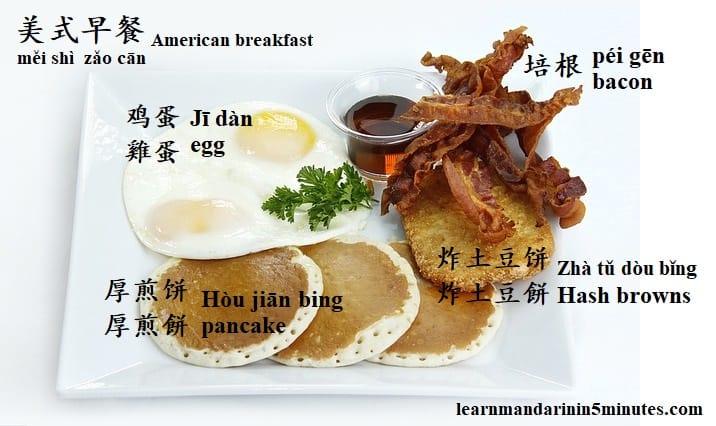
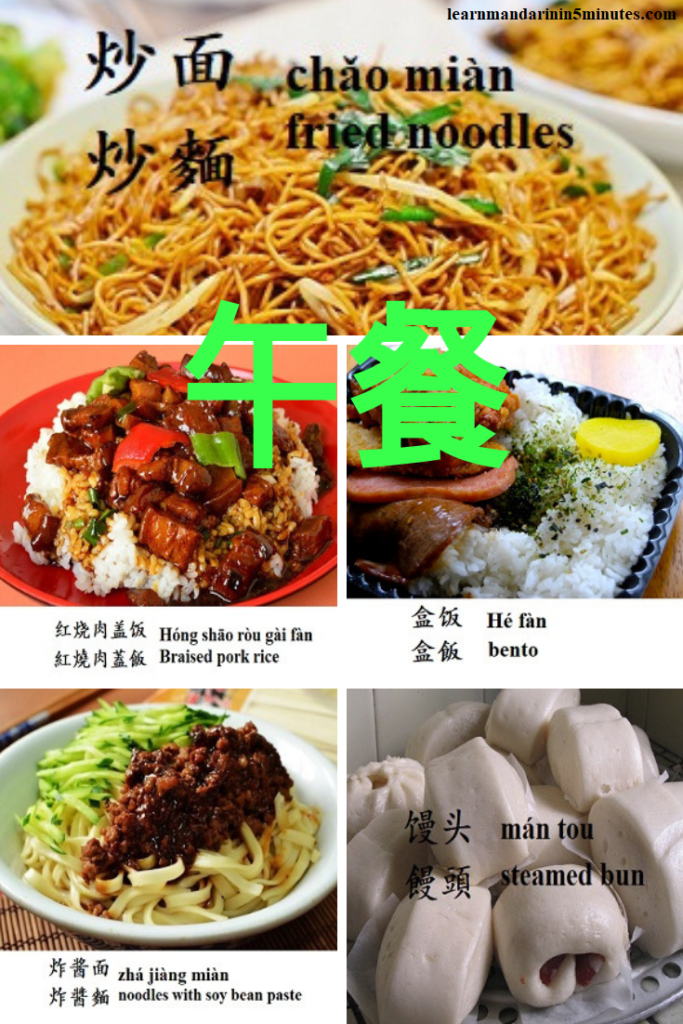
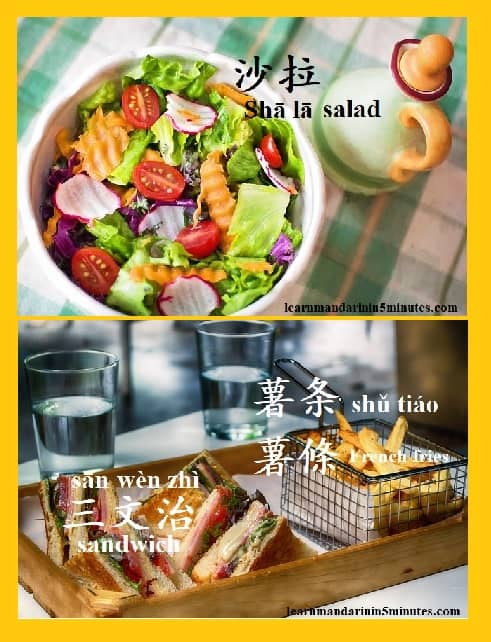
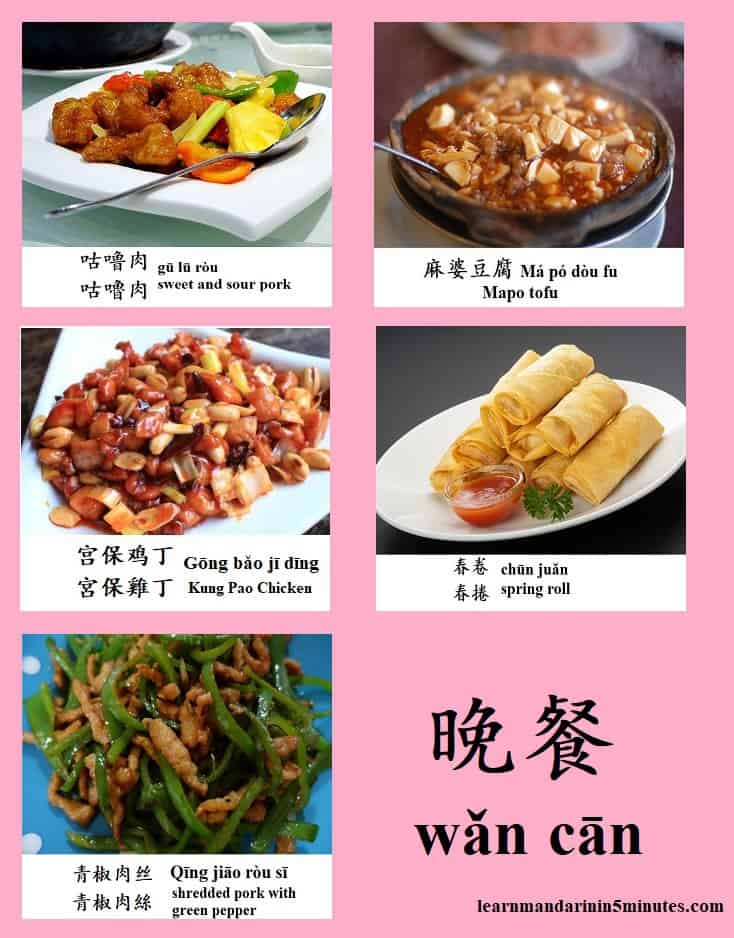
2 thoughts on “22 important Chinese words about food you should know”
This tutorial was excellent. One missing one was “can I have chopsticks please”. Apparently I tried this in a restaurant and was told I said hurry up. My pronunciation of zi was not good. Maybe that’s what happened. Anyway I’m still learning.
chi and zi can be difficult to pronounce. You will get it right someday.
Happy learning!
^^
Comments are closed.